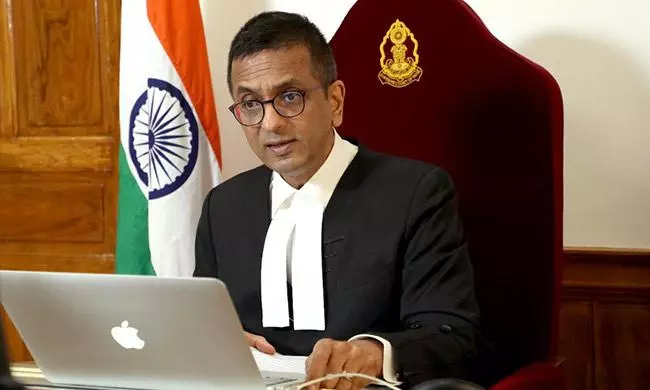
CJI criticises ex-SC judge Krishna Iyer for postulating 'rigid economic theory'
The remarks over the approach of Justice Iyer was made in the majority judgement penned by Chief Justice D Y Chandrachud for himself and six other judges of the bench

New Delhi, Nov 5 (PTI) The majority judgement of the Supreme Court on Tuesday on the private properties issue criticised former apex court judge V R Krishna Iyer for "postulating a rigid economic theory" that advocated for greater state control over private resources as an exclusive basis for constitutional governance.
The remarks over the approach of Justice Iyer was made in the majority judgement penned by Chief Justice D Y Chandrachud for himself and six other judges of the bench.
The CJI-led nine judge bench, by a majority 7:2, on Tuesday held all private properties cannot form part of 'material resources of the community' empowering states to take them over for distribution to serve "common good" under the Constitution.
"The doctrinal error in the Krishna Iyer approach was, postulating a rigid economic theory, which advocates for greater state control over private resources, as the exclusive basis for constitutional governance," the CJI wrote in the 193-page judgement.
In 1977, in a case titled as state of Karnataka vs Shri Ranganatha Reddy, a seven-judge bench, by a 4:3 majority, had held that privately owned resources did not fall within the ambit of 'material resources of the community'.
However, Justice Iyer had dissented from the majority and held that the state can take over private resources for distribution to subserve common good. He expressed similar views in other judgments also.
The CJI, in his judgement, referred to the approach of Justice Iyer and said it postulated a rigid economic theory.
Justice Chandrachud referred to various observations of Justice Iyer in several judgements.
"To declare that Article 39(b) includes the distribution of all private resources amounts to endorsing a particular economic ideology and structure for our economy. Justice Krishna Iyer's judgement in Ranganatha Reddy, which was followed inter alia in Sanjeev Coke and Bhim Singhji, was influenced by a particular school of economic thought," the CJI said.
"For instance, in Ranganatha Reddy, Justice Krishna Iyer observed that Article 39(b) constitutes 'a directive to the State with a deliberate design to dismantle feudal and capitalist citadels of property'. In Bhim Singhji, Justice Krishna Iyer cited Karl Marx in his judgement to observe that taking over large conglomerations of land is necessary to make Article 39 a 'constitutional reality'," Justice Chandrachud said.
The CJI said interestingly, in the same decision, Justice Iyer also expressed his view about the nature of the economy and observed that our economy was 'in the transitional stage... undergoing a fabian transformation'.
"Significantly, both Justice Krishna Iyer (in Ranganatha Reddy and Bhimsinghji) and Justice Chinappa Reddy (in Sanjeev Coke) consistently referred to the vision of the framers (of the Constitution) as the basis to advance this economic ideology as the guiding principle of the provision. However, as noted earlier in his judgement, the vision of the framers while drafting the Constitution was not to lay down a particular form of social structure or economic policy for future governments," the majority judgement said.
The verdict referred to the debates in the Constituent Assembly and said B R Ambedkar was categoric in his constitutional vision and had rejected the prevalence of one dogma.
"The Constitution was framed in broad terms to allow succeeding governments to experiment with and adopt a structure for economic governance which would subserve the policies for which it owes accountability to the electorate. According to Dr Ambedkar, if the Constitution laid down a particular form of economic and social organisation, it would amount to taking away the liberty of people to decide the social organisation in which they wish to live...," the CJI said.
Justices BV Nagarathna and Sudhanshu Dhulia strongly disagreed with the views of the CJI on Justice Iyer.
Justice Iyer played an important role in an era of judicial activism and has written several landmark judgements. PTI

